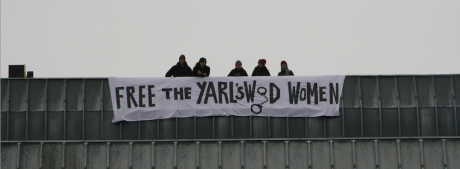/arc-anglerfish-arc2-prod-shropshirestar-mna.s3.amazonaws.com/public/C2GFORFNFBAJFD5QAPMWSTO5NE.jpg)
Graham French and Pauline Taylor-French
Why does the English government hate Pauline Taylor-French? Pauline Taylor-French is now 45 years old. At the age of 28, Pauline Taylor-French found herself in an abusive relationship, took her two daughters and fled Jamaica. She went to England, where she has lived, and thrived, for 17 years. For 17 years, Pauline Taylor-French lived `legally’ in England on a series of student visas. A few years ago, she met Graham French. Soon after, they established a home together. They became engaged. In 2017, Pauline Taylor and Graham French were engaged and making their wedding plans. Then, in September 2017, Pauline Taylor was taken to Yarl’s Wood, where she was detained for 24 days. Pauline Taylor and Graham French have since married. Pauline Taylor-French is married to a citizen of the United Kingdom. Both of Pauline Taylor-French’s grandmothers were British citizens. Pauline Taylor’s grandfather fought with the Royal Navy in World War II. None of that seems to matter. Why does none of that matter? Why does the English government go out of its way to demonstrate its hatred for Pauline Taylor-French?
While in Yarl’s Wood for 24 days, Pauline Taylor-French lost 14 pounds. She engaged in self harm. She was put on suicide watch. Reflecting on their situation, Graham French says, “Why are they treating us like this? All her family are here, they have settled status, she has British grandparents, she’s married to me I’m a British citizen, we meet all the criteria for a spouse visa. She almost died when she was detained, being sent to Jamaica could kill her.”
Being sent to Jamaica could kill her. As far as the English government is concerned, that’s fine. Pauline Taylor-French was never meant to survive: “Where an application has been refused and a person has no legal basis to remain in the UK, they should make arrangements to leave.” If being in Jamaica kills her, that’s Pauline Taylor-French’s fault. The Home Office is only following orders.
Why does the English government hate Pauline Taylor-French? A year ago, we asked why the English government hates 59-year-old Yvonne Williams and 64-year-old Yvonne Smith, both originally Jamaican and both with no ties left in Jamaica? Two years ago, we asked why the English government hates 61-year old Paulette Wilson, born in Jamaica and with no ties left in Jamaica? Nine years ago, we asked why the English government hates Jamaican born asylum seekers Denise McNeill, 35 years old, and Shellyann Stupart, at that time both involved in a hunger strike at Yarl’s Wood.
In 2014, we asked why the English government hates 40-year-old Jamaican born Christine Case. Officially Christine Case died of a massive pulmonary thromboembolism, but fellow prisoners said Christine Case was denied medical assistance. Christine Case called for help, as she was feeling severe chest pains, and the `care’ she received was paracetamol, a mild analgesic for minor aches and pains. Serco runs Yarl’s Wood. Serco claimed they have “24-hour, seven-day urgent medical cover on site at Yarl’s Wood.” Ask Christine Case.
That was 2014. In 1993, immigration officers killed 40-year-old Jamaican Joy Gardner, 40, as her five-year-old son and her mother watched. Joy Gardner had applied for compassionate leave to remain in England. She had no idea that her appeal had been denied. The police showed up and opened fire. Twenty years later, Joy Gardner’s mother, Myrna Simpson, says, simply, “We need justice for our children, our grandchildren and our great-grandchildren.” Who remembers Joy Gardner? Who remembers Christine Case?
These Jamaican born women are surrounded and embraced by Black and Brown sisters from across the Global South and East: Evenia Mawongera, from Zimbabwe; Opelo Kgari and Florence Kgari, from Botswana; Lazia Nabbanja, Erioth Mwesigwa, Betty Tibikawa, from Uganda; Kelechi Chioba, Aderonke Apata, from Nigeria; Lydia Besong, from Cameroon; Dianne Ngoza, from the DRC; Mabel Gawanas, from Namibia; Mariam Ibrahim Yusuf, from Somalia; Chennan Fei, from China; Shiromini Satkunarajah, from Sri Lanka; Irene Clennell, from Singapore; Bita Ghaedi, from Iran; Azbaa Dar, from Pakistan. So many named, so many unnamed. This is but a sliver of the empire of hatred being constructed by immigration regimes, in England, the United States, Australia, and beyond. Why does England hate Pauline Taylor-French?
This week the Home Office gave Pauline Taylor-French a 30-month stay… and then what? Two years of intense struggle, fear, anxiety, terror do not just go away, nor are they meant to. Too often have we asked why this State or that State hates this Black woman or that Brown woman. The time for questions is over. It’s time, way past time, to turn down the walls, to end the terror, to reckon with the hatred of women of color, to confront the policies that are today’s iteration of empire as genocide. “They should make arrangements to leave.”

Christine Case
(Photo Credit 1: Shropshire Star) (Photo Credit 2: BBC)
